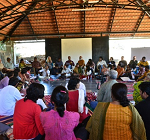India has a special, perhaps even unique, role in the global search for an economic model that would foster actual human well-being, not just GDP growth. This was the central theme of the third International Economics of Happiness Conference 2014, held in Bangalore from March 14 to 16.
Mahatma Gandhi’s legacy of fostering systems that decentralise power and enfranchise those at the lowest rungs of the socio-economic ladder, is an inspiration for those seeking to build ‘alternative’ economic systems. However, that historical legacy, though inspiring, cannot in itself mobilise hundreds of young professionals, activists and academics. So what is this budding vision of change, and why do so many see a role for India?
Many participants came primarily out of sheer curiosity – what on earth is ‘economics of happiness’? The organisers – the International Society for Ecology and Culture (ISEC), a non-profit based in Berkeley, U.S., Shikshanthar, an educational institution based in Udaipur, and the Bhoomi College for Sustainability Studies, Bangalore – see localisation as the key component in the economics of happiness.
By localisation they do not mean parochial isolation, or rejection of global linkages. Instead, the focus is on the decentralisation of economic power and finding a new definition of progress – one that moves away from material accumulation and instead gives greater salience to cultural and spiritual well being.
“The glass is becoming fuller, but the trickle-down is less and less, because trickle-down is a false hope”, said Samdhong Rinpoche, former Prime Minister of the Tibetan government-in-exile, during a group discussion at the conference. The answer, he believes, lies in local, community-anchored economies that are need-based rather than driven by endless material consumption.
This approach, however, may seem out of tune given the broad consensus among India’s business elite and the middle class that the country needs to rapidly increase its material consumption and GDP. Yet, votaries of the economics of happiness are hopeful because, compared to North America and Europe, Indian society still has more small, local haats or bazaars – that is, a vibrant ‘informal’ or ‘unorganised sector’.
There is now a diverse range of social enterprise that aims to strengthen those who operate in this informal sector. Further, activist networks like the Alliance for Sustainable and Holistic Agriculture (ASHA) are fighting for policy shifts that will remove obstacles to the well-being of those at the bottom of the pyramid.
Of those drawn to this gathering, some aspire for a deeper, a more representative democracy. They regard this as a pre-requisite for economic democracy – that is, an expansion of opportunities and access to resources for all.
That is why the case of Menda Lekha, a tribal village in Maharashtra, was frequently cited as an example. The panchayat of Menda Lekha has successfully asserted its collective ownership over the produce of a nearby forest, and set up both ecologically sustainable and economically efficient systems for marketing the same. Even more significant is that Menda Lekha has developed processes of decision making through consensus, thus fostering internal democracy. This combination of internal democracy and strengthening of local economy makes Menda Lekha an example of the economics of happiness.
This leads us to the question: how can more villages and towns follow Menda Lekha’s example? Networks like those at the conference certainly help raise awareness about the principles followed by Menda Lekha, as well as the problems they have faced along the way. This can shorten the learning curve for other communities.
Hence, scaling or replicating such examples may not be the biggest challenge. Rinpoche believes the challenge lies in getting a critical mass of people to reject a wants-based market culture, and recognise the need to shift towards a needs-based economy. Given the rising material aspirations in India, this will seem counter-intuitive to many people.
Even Bhutan’s famous experiment with Gross National Happiness – a concept that gave primacy to actual well-being rather than the Gross National Product – is reportedly being buffeted by the growing consumerist aspirations of a young population.
Yet below the surface of those more visible trends is a search for livelihoods that not only meet material needs, but also enable people to live more culturally and spiritually fulfilling lives. It is this longing that seemed to bring hundreds of young urban professionals to the conference.
Today, such a dream may seem more of a delusion. But gatherings such as this certainly establish that there are enough people out there who want an alternative.
This article is the second part of a two-part series.
Rajni Bakshi is the Gandhi Peace Fellow at Gateway House: Indian Council on Global Relations.
This blog was exclusively written for Gateway House: Indian Council on Global Relations. You can read more exclusive content here.
For interview requests with the author, or for permission to republish, please contact outreach@gatewayhouse.in.
© Copyright 2014 Gateway House: Indian Council on Global Relations. All rights reserved. Any unauthorized copying or reproduction is strictly prohibited


